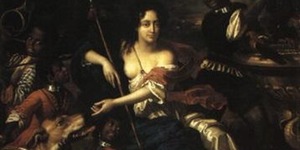Conflicting Views on Slavery in Early MA--Reading & Discussion Group
Saturday, Jun 03, 2017 1:00p -
3:00p
Where:
MA Historical Society
1154 Boylston Street
Boston, MA 02215
Admission:
FREE
Categories:
Note: This is a discussion, not a lecture. Led by early American historian Holly Brewer, we’ll examine primary sources (which we’ll send to you after you register) to see how they shed light on Massachusetts’s relationship to slavery within the framework of the British empire and slave trade. You don’t need to be an expert, an academic or a student. Enjoy the readings, come with your ideas, and join the discussion.
In 1644, a ship’s captain and first mate sued each other for damages to their goods in the Boston court. The court denied them a share in the human beings they claimed as property “negars,” on the grounds that the African men were not goods. They had been taken unlawfully and were "stolne" - stolen men.
Instead, captain and first mate were charged with murder and “man-stealing” by both Massachusetts’ elected general court and its high court. The court ordered the return of the Africans to their home continent, together with a letter of public apology which was to include “the indignation thereabouts, and justice thereof.”
While recent scholars have argued that slavery was widespread in colonial Massachusetts, they have ignored change over time, extensive evidence of early disagreement over slavery, and blurred legal definitions, using nineteenth-century definitions of slavery to make claims about the seventeenth century. In fact, looking closely at the documents, we can see that Massachusetts never developed a strong legal structure to support slavery. In New England, such “slavery” was often hedged and limited, justified in narrow ways (justified mostly, for example, for prisoners of war), very differently than in many other colonies. Even then, Massachusetts never developed a slave code that, for example, paid masters for the costs of their executed slaves, forbade manumission, prevented slaves from testifying against masters, or set up slave patrols, to name only a few key slave statutes passed during the 1660s and 1700s in British colonies from Barbados to Virginia. to define slavery.
The evidence in the readings for this discussion focuses on whether and under what conditions Massachusetts’ elected legislators believed labor could be forced and the extent to which such laborers could and should be controlled and masters limited. Readings range from England’s Elizabethan labor laws, feudal law, letters and court decisions as well as legal codes and policies across the empire.
Join Holly Brewer, award-winning professor of history at University of Maryland, in examining the nuances of Massachusetts’ positions on slavery within the context of the English imperial system in the seventeenth century. Compared to other colonies, she argues, slavery was specific and confined, not the all-encompassing belief in inherited enslavement. Through an analysis of slave codes and practices and Massachusetts court records, she reveals the internal and especially external struggles that marked the colony’s passage towards permitting slaveowning.
About Holly Brewer
Holly Brewer is Burke Chair of American History and associate professor at the University of Maryland. She is currently finishing a book that situates the origins of American slavery in the ideas and legal practices associated with the divine right of kings, provisionally entitled Inheritable Blood: Slavery and Sovereignty in Early America and the British Empire. She was awarded a Guggenheim Fellowship for this research. Her first book, By Birth or Consent: Children, Law, and the Anglo-American Revolution in Authority, won three national prizes.
READINGS
To be emailed to you after you register.
-

Sponsored -

Sponsored -

SponsoredThe Boston Outdoor Expo 2024
Saturday, Apr 27, 2024 goes until 04/28
Boston Convention & Exhibition Center

